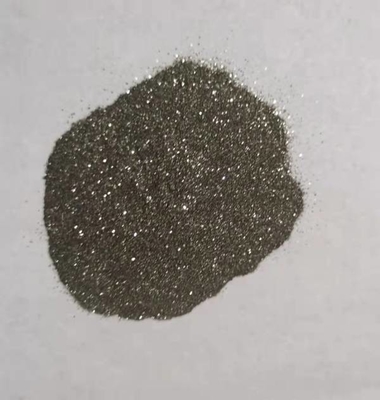Silver 9.2kGS Rare Earth Permanent Magnetic Powder
Product Introduction
Rare earth magnetic powders are strong permanent magnets made of rare earth element alloys. Rare-earth magnets, developed in the 1970s and 1980s, are the strongest type of permanent magnets ever manufactured, producing much stronger magnetic fields than other types of magnets such as ferrite or alnico magnets. Rare earth magnets typically generate fields in excess of 1.2 Tesla, while ferrite or ceramic magnets typically generate fields between 0.5 and 1 Tesla.
Feature
The crystal structure of rare earth magnetic powder has high magnetic anisotropy. This means that the crystals of the material are preferentially magnetized along certain crystallographic axes, but rarely in other directions. Like other magnets, rare-earth magnets are composed of microcrystalline particles that are aligned in a strong magnetic field during manufacture so that their magnetic axes all point in the same direction. The resistance of the lattice to changing the direction of its magnetization makes these compounds very high coercive (anti-demagnetization), so strong demagnetization fields in the finished magnet do not reduce the magnetization of the material.
Atoms of rare earth elements can have high magnetic moments. Their orbital electronic structures contain many unpaired electrons; in other elements, nearly all electrons exist in pairs of opposite spins, so their magnetic fields cancel each other out, but in rare-earth elements the fields cancel each other out much less. This is a result of the incomplete filling of the f-shell, which can contain up to seven unpaired electrons. In a magnet, unpaired electrons line up so that they spin in the same direction, creating a magnetic field. This gives the material a high remanence (saturation magnetization Js). The maximum energy density B-H is proportional to J s 2 , so these materials have the potential to store large amounts of magnetic energy. The energy product B-H max of a neodymium magnet is about 18 times the volume of a "normal" magnet. This makes rare earth magnets smaller than other magnets with the same field strength.
We can provide you with a variety of magnetic powders: ferrite, Alnico, NdFeB and SmCo powders.
(1) Magnetic ferrite powder is suitable for wet or dry pressing production process to produce different grades of hard ferrite magnets. According to customer's needs, we can provide different particle size of ferrite powder, ferrite powder can be divided into isotropic ferrite powder and anisotropic ferrite powder.
(2) Alnico magnetic powder is made from Alnico magnets crushed into the required particle size. The characteristic is the small temperature coefficient of Br. This powder is mainly used as raw material for bonded magnets, plastic magnets; various samarium cobalt fault detection; magnetic printing and other high temperature sensitive fields.
3) NdFeB powder can be used in automotive industry, office automation, automobiles. DC brushed motors. Multi-pole stepper and spindle motor applications. Magnetic coatings, magnetic printable substrates, magnetic films, medical diagnostics and therapeutics, video tapes, copying toner, fingerprint recognition, sensors, fuel injectors, permanent magnets, nanoscale fluid seals, electric toys and magnetically cured products.
4) Samarium Cobalt Powder Samarium Cobalt Powder Samarium Cobalt Magnetic Powder Rare Earth Magnetic Powder Used to produce polymer bonded samarium cobalt magnets by compression molding.
| Production List |
| Series |
0806 |
10-8 |
1208 |
1309 |
1309A |
1412 |
1507 |
1509 |
1510 |
1610 |
1609D |
magnetic Powder
VSM |
Br |
7.00~7.20 |
7.60~7.75 |
8.10~8.30 |
8.40~8.55 |
8.5-8.7 |
8.45-8.65 |
9.2-9.45 |
8.85-9.1 |
8.85-9.1 |
9.05-9.2 |
8.85-9.2 |
| kGs |
| Hcj |
5.00~7.50 |
7.80~8.80 |
8.00~8.80 |
9.00~9.80 |
9-9.8 |
12-12.7 |
6.8-7.8 |
9.2-9.8 |
10-10.8 |
9.3-10.1 |
9.2-9.8 |
| kOe |
| Hcb |
4.30-5.00 |
5.20~5.60 |
5.80~6.30 |
6.20~6.80 |
6.2-6.8 |
6.7-7.2 |
5.5-6 |
6.4-6.9 |
6.4-6.9 |
6.7-7.2 |
6.7-7.2 |
| kOe |
| (BH)max |
8.80-9.30 |
11.70~12.10 |
13.00~13.80 |
14.20~14.80 |
14.2-15.1 |
14.4-15.2 |
15-16 |
15.5-16.3 |
15.5-16.3 |
16.5-17.5 |
16.5-17.5 |
| MGOe |
magnet
D10 |
Br |
5.50~5.90 |
6.00~6.15 |
6.35~6.50 |
6.60~6.80 |
6.6-6.9 |
6.7-6.8 |
7.3-7.5 |
6.9-7 |
6.9-7 |
7.05-7.15 |
7.05-7.15 |
| kGs |
| Hcj |
5.00~7.50 |
7.80~8.80 |
8.00~8.80 |
9.00~9.80 |
9-9.8 |
12-12.7 |
6.8-7.8 |
9.2-9.8 |
10-10.8 |
9.3-10.1 |
9.2-9.8 |
| kOe |
| Hcb |
3.80~4.40 |
4.80~5.10 |
5.10~5.40 |
5.40~5.80 |
5.4-5.8 |
5.7-5.9 |
5.3-5.5 |
5.7-6 |
5.7-6 |
5.7-6.2 |
5.8-6.2 |
| kOe |
| (BH)max |
6.00~6.40 |
7.40~7.70 |
8.30~8.70 |
8.90~9.30 |
9-9.4 |
9.6-9.8 |
10.3-10.5 |
9.9-10.3 |
9.9-10.3 |
10.2-10.6 |
10.2-10.6 |
MGOe
|
The process
The molten NdFeB alloy is sprayed onto the cooling rollers at a certain speed and instantly solidifies to form a thin strip of 0.02-0.05mm thickness. During the rapid cooling process, Nd2Fe14B structure is formed, and finally the thin strip is broken into powder
Common applications for rare earth magnets include
Computer hard disk drives
Wind turbines
Speakers/headphones
Bicycle generators
MRI scanners
Fishing reel brakes
Permanent magnet motors in wireless tools
High performance AC servo motors
Traction motors and integrated starter generators in hybrid and electric vehicles
Mechanically powered flashlights that use rare earth magnets to generate electricity in a cranking or rotating (hand crank driven) motion
Industrial applications, such as maintaining product purity, equipment protection and quality control
Trapping of fine metal particles in lubricating oils (crankcases of internal combustion engines, but also gearboxes and differentials) to stop the circulation of said particles so that they cannot cause wear in moving machine parts
 Your message must be between 20-3,000 characters!
Your message must be between 20-3,000 characters! Please check your E-mail!
Please check your E-mail!  Your message must be between 20-3,000 characters!
Your message must be between 20-3,000 characters! Please check your E-mail!
Please check your E-mail!



